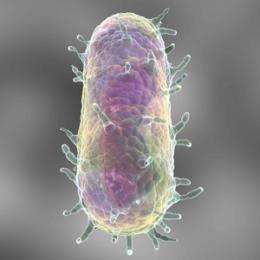Proteogenomic strategies help refine annotations of three Yersinia strains

(Phys.org) -- Strains of bacteria from the genus Yersinia are pathogenic with a wide virulence range -- Y. pseudotuberculosis causes intestinal distress, and Y. pestis causes the plague.
To better understand and potentially design ways to mitigate the effects of Yersinia on human health, a research team took on the task of refining the genome maps of three Yersinia strains.
This annotation process used the proteome and transcriptome, or collections of proteins and transcripts present, to discover new information about the genome.
The team used both proteomic and microarray data to study the highly related pathogenic Yersinia strains, Y. pestis CO92, Y. pestis Pestoides F, and Y. pesudotuberculosis PB1/+.
Each bacteria was grown under conditions relevant to disease, and samples were collected through time. Each proteomic sample was subjected to protease digestion then strong cation exchange fractionation with analysis on one of EMSL’s mass spectrometers.
Peptide data were searched against translations of all six possible reading frames of each genome using SEQUEST software to identify the proteins present in each bacteria sample.
Excitingly, data confirmed the validity of nearly 40% of the computationally predicted genes and discovered 28 novel proteins expressed under conditions relevant to infections.
In addition, 68 previously identified protein coding sequences were shown to be invalid. This new multi-faceted approach layers several types of evidence and substantially improves the genome annotation process.
Importantly, the team’s work established refined genome annotations that provide essential information needed for a better understanding of how the plague functions, may provide new targets for therapeutics, and should speed the characterization of other pathogenic bacteria.
More information: Rutledge AC, et al. 2012. " Comparative Omics-Driven Genome Annotation Refinement: Application across Yersiniae." PLoS One 7(3):e33903. doi:10.1371/journal.pone.0033903
Journal information: PLoS ONE
Provided by Environmental Molecular Sciences Laboratory
















